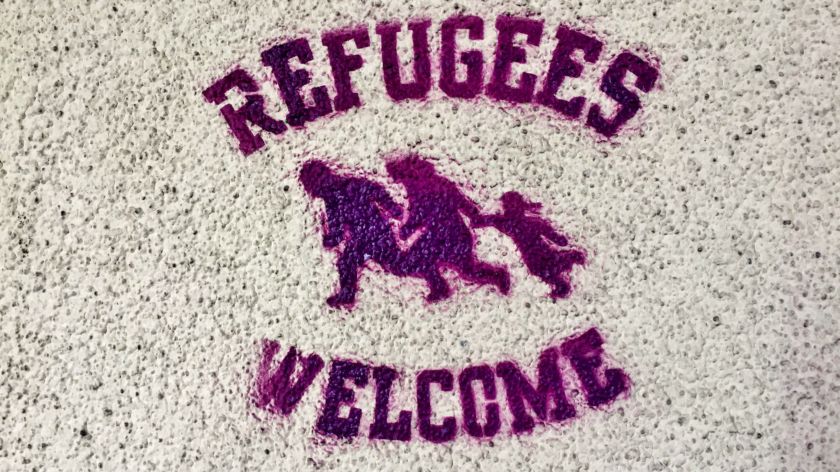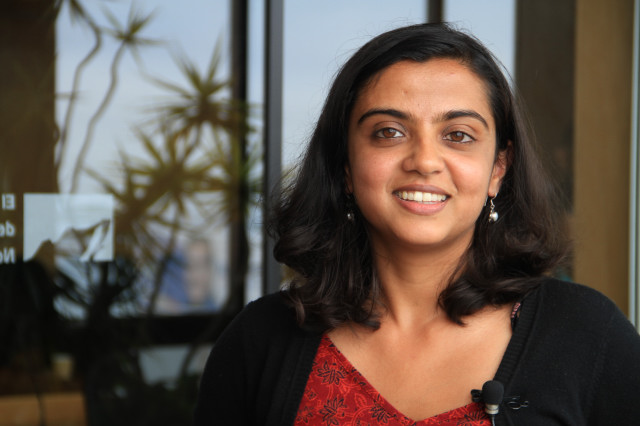Call for more refugees in the classroom
-
 Foto: edu aguilera (Creative Commons)
Foto: edu aguilera (Creative Commons)
This academic year, refugees can once again attend lectures at the Department of Geography, Planning and Environment. According to initiator Kolar Aparna, Radboud University has changed ever since it had the refugee centre at Heumensoord as its neighbour, but there's a lot more that the university can do to help the new Nijmegen residents.
‘The Heumensoord camp may be gone, but there are still a lot of refugees in Nijmegen’, says Kolar Aparna, a PhD candidate at the Department of Geography, Planning and Environment (GPE). ‘It’s our social responsibility to give these refugees access to both the university and the city of Nijmegen.’
Aparna is the founder of Asylum University, an informal, low-key network that helps refugees gain access to higher education. The significance of this initiative became particularly evident last year, with the arrival of three thousand refugees in Heumensoord. One of them was Biniam, a former Vox columnist, who took classes at Radboud University.
‘I hope more programmes will start welcoming refugees into their classrooms’
This academic year, refugees can once again attend lectures at the Department of Geography, Planning and Environment. “In our opinion, these lectures are really enriched when refugees are given the opportunity to participate in the discussions and share their ideas,” says Aparna. ‘As for how the refugees themselves perceive these classes: you’ll have to ask them. We did ask ourselves the same sort of question of course; after all, some may not find geography all that interesting. That’s why I hope more programmes will start welcoming refugees into their classrooms.’
Aparna also stresses the importance of creating social networks by opening classrooms to refugees. ‘We wrote a letter of recommendation to the University of Amsterdam for Biniam, who now lives in Amsterdam. This letter was one of the reasons he was able to attend summer school this year.’
 Food for thought
Food for thought
Aparna saw how the university changed with the arrival of Heumensoord. ‘The longer the camp existed, the less anxious the university became about getting involved in the refugee issue.’ The university’s most prominent contribution was the series of lectures entitled Food for Thought organised by the Faculty of Law. This lecture series even drew the Dutch Minister of Education to Nijmegen. The working group RU for Refugees also organised various activities.
Aparna does have concerns about the university’s initiatives. ‘Unfortunately, refugees are still treated like outsiders at times’, she says. ‘We have to come to the realisation that refugees are an integral part of our city.’ In other words: in order to make a real difference in the long term, it’s not enough to simply invite refugees to a workshop or a lecture series. We have to incorporate them into the Radboud community.
Internship
The biggest added value is the social contact these refugees make. Aparna gives the example of a refugee who lives in Nijmegen and is an expert in the field of geographic information systems (GIF). ‘My colleague Linda Carton helped him find an internship position. Who knows, he may just come back one day.’




nvt schreef op 28 september 2016 om 01:58
“Unfortunately, refugees are still treated like outsiders at times,” she says. “We have to come to the realisation that refugees are an integral part of our city.”
Waarom moeten wij tot deze realisatie komen? Een vluchteling is iemand die zijn woongebied is ontvlucht uit vrees voor geweld of zijn leven. Volgens deze definitie zal deze persoon terug te gaan zijn of haar land wanneer het daar veilig is. Hierbij gaat het dus niet om een integraal onderdeel van de stad.
Lothar Smith schreef op 20 oktober 2016 om 23:01
Beste nvt,
De gedachte dat iemand bij beëindiging van een oorlog weer terugkeert naar het land van oorsprong is idd de vooraf gewenste intentie van alle betrokkenen, overheidsinstanties, maar zeker ook de vluchtelingen, die maar wat graag de natte Nederlandse winters achter zich willen laten, ook om hun families en vrienden weer willen zien. Helaas is de realiteit dat er van datgene wat men achterliet bij terugkomst nog maar weinig over is. In die zin is de terugkeer vaak eerder een volgende nieuwe stap, soms nog complexer dan de vlucht naar een land als Nederland. Het is zelden een terugkeer naar een oud leventje..
Maar het eigenlijke punt van Kolar Aparna, zoals ik haar ideeën begrijp, is dat zelfs bij een tijdelijke status (en dat geldt bijvoorbeeld ook voor studenten die een paar jaar in de stad wonen) het belangrijk is om mensen niet onzichtbaar te maken in een stad, ze buitenspel te zetten door ze fysiek af te zonderen, maar juist moet proberen ze deel van de stad te laten zijn. Hiermee voorkom je ook o.a. een mogelijke rusteloosheid onder vluchtelingen, voor wie niets vervelender is dan niks te mogen, niks te kunnen doen, en vooral ook niet weten hoe lang dit nog zo zal blijven. Er is voor hen dan sprake van een aanhoudend verlies van social en human capital, van hun gevoel van waardigheid, en van hun algemene gevoel van betekenis in het leven. Juist mogelijkheden scheppen voor vluchtelingen om dit kapitaal wel nuttig in te zetten, op welke schaal dan ook, biedt hen, maar ook de stad Nijmegen, nieuw elan, en voor de toekomst waardevolle blijvende banden met verre regio’s.
Dat past toch goed bij een stad als Nijmegen, met haar indrukwekkend lange geschiedenis van verbondenheid met andere regio’s op de wereld.